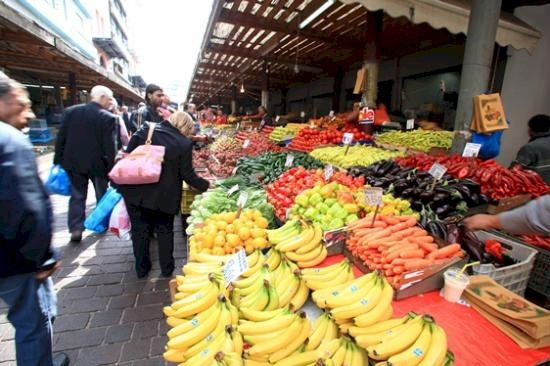
Turks Turn to Greek Markets to Combat Inflation
SadaNews - Hardly a month goes by without Cihan Citatek getting into his car with his passport for a trip from Istanbul to Alexandroupoli, the Greek coastal city about 40 kilometers from the Turkish border. After a four-hour drive, he begins to stroll through the crowded aisles of the local store, filling his cart with wine, cheese, and other grocery products, at a fraction of the cost compared to what he pays in his home country.
"The olive oil that sells for ten euros a liter you can only find in Turkey for double that price," says Citatek, general manager of a food and beverage company who says he is mainly looking for high-quality products at better prices. He added: "My purchases cost on average a third of what they would be in Turkey."
Turks Flood the Greek Town
Cross-border shopping has become a routine for many who have discovered that rising food prices in Turkey and the strength of the lira make Greece a cheaper alternative for daily purchases. This trend, though not new, is accelerating: 6% of Turks who crossed the border into Greece during the first nine months of the year did so for shopping, the highest rate since at least 2012, according to data from the Turkish statistics agency.
"Turks have flooded Alexandroupoli," Citatek, 48, joked. "Sometimes you see hundreds shopping in the store, then going to a restaurant and talking about their purchases and their costs."
Some visitors share their experience on social media channels like YouTube and TikTok, where they garner thousands of views for videos showcasing the prices of various products and stores.
A quick look at the supermarket shelves tells the whole story. Prices for many daily products at the Lidl store in Alexandroupoli are noticeably cheaper than those at Carrefour stores in Turkey, although some staple products still have better prices in Turkey. For example, a kilogram of minced meat costs 9.36 euros ($10.8) in Greece compared to 12.10 euros in Turkey, while beef sausages sell for about half the Turkish price. Gouda cheese and Kinder chocolate cost about a third of their price on the other side of the border.
Shift in Turkish Monetary Policy
Behind this trend is a shift in monetary policy in Turkey aimed at curbing inflation by maintaining high-interest rates and a strong currency, which has helped reverse the trend of shopping trips. A few years ago, it was Greeks coming from Turkey loaded with food, clothes, and other goods. Back then, Turkey's unconventional monetary policy - led by President Recep Tayyip Erdoğan, who believed that lowering interest rates would curb rising inflation - pressured the lira and gave the euro more purchasing power.
But since mid-2023, when Erdoğan decided to appoint Mehmet Şimşek, a former bond strategist at Merrill Lynch, as finance minister and returned to managing the economy in a conventional manner, the balance has begun to shift. The real exchange rate of the lira - a measure of its value against foreign currencies adjusted for inflation - has risen, and food price inflation has decreased to 35% compared to 54%.
Turkish Food Prices Continue to Rise
For consumers, this means the pace of price increases is slowing, but the grocery bill has actually continued to rise. The basket of food and non-alcoholic beverages tracked by the Turkish statistics agency has increased by 144% since Şimşek took office until October.
The central bank said on Friday that it expects inflation to end this year above 30%, before falling by nearly half by the end of 2026.
As price pressures on families increase, the main opposition party has accused Erdoğan of pushing Turks to travel abroad just to fill their kitchen cupboards.
Özgür Özel, the leader of the Republican People's Party, said on Tuesday: "After 23 years, this is the state of the country that Erdoğan prides himself on."
One-Day Shopping Trips in Greece
Just as Greek travel companies did in the past, tour operators in western Turkish cities like Istanbul, Çanakkale, and Bursa have jumped on the bandwagon by organizing one-day bus trips to Alexandroupoli. For around 50 euros - the cost of the ticket plus exit visa fees - Turkish travelers can fill their bags from retail chains like Lidl, Jumbo, and Metro.
"People buy everything, including meats and cheeses," said Sıtkı İgneli, a partner at Atom Tur travel agency in Istanbul, adding that "many clients enjoy the cheaper seafood at restaurants."
Atom's buses depart late Friday night every week and arrive in Alexandroupoli the following morning. Clients spend three and a half hours in the supermarket, followed by a city tour and free time, according to the company's website. By noon, the group returns to Turkey.
Muhammed Tamdiğer, owner of the Gezihane agency in Bursa, says his clients often return loaded with pasta, yogurt, or vegetables "at cheap prices and with decent quality."
Citatek plans to continue his border trips to take advantage of the lira's value and escape high prices in his country, although the return trip, with so many thinking the same way, can be exhausting.
Citatek said on Thursday: "I was there a few days ago. The passport check on the return trip took hours due to the very long queue."

مصر: تعديل وزاري يشمل تعيين وزراء جدد من ضمنهم وزير الدفاع

Lavrov: Russia Will Take Countermeasures If Greenland Is Turned Into a Military Zone

Military Agreement Between China and Bangladesh Raises Concerns in the United States

Maliki: Limiting Weapons to the State and a Unified Army is Essential for Iraq's Stability

Alimi: Any Peace with Houthis Without Guarantees Will Renew Violence

Four People Killed in Russian Airstrike in Eastern Ukraine

Colombian President Announces Survival of Assassination Attempt

